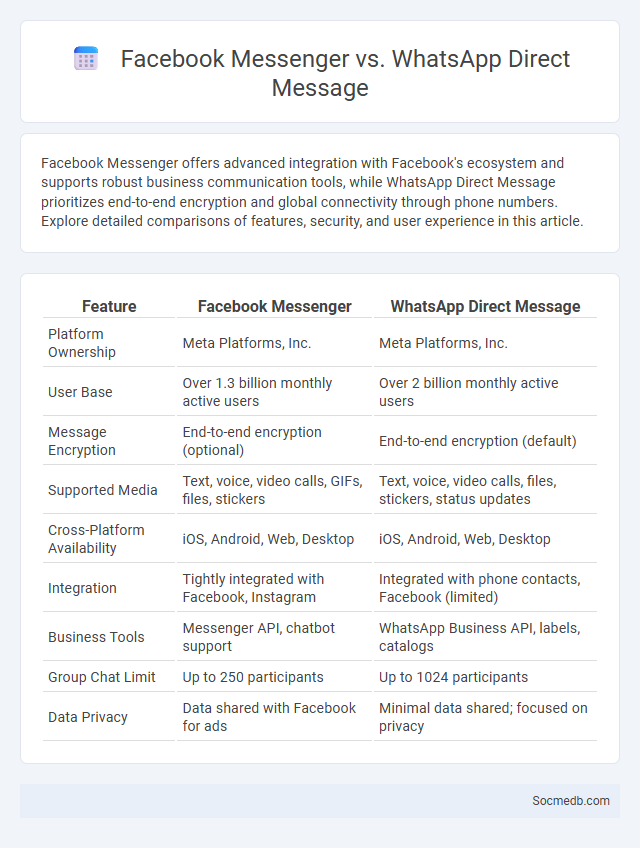
Photo illustration: Facebook Messenger vs WhatsApp Direct Message
Facebook Messenger offers advanced integration with Facebook's ecosystem and supports robust business communication tools, while WhatsApp Direct Message prioritizes end-to-end encryption and global connectivity through phone numbers. Explore detailed comparisons of features, security, and user experience in this article.
Table of Comparison
| Feature | Facebook Messenger | WhatsApp Direct Message |
|---|---|---|
| Platform Ownership | Meta Platforms, Inc. | Meta Platforms, Inc. |
| User Base | Over 1.3 billion monthly active users | Over 2 billion monthly active users |
| Message Encryption | End-to-end encryption (optional) | End-to-end encryption (default) |
| Supported Media | Text, voice, video calls, GIFs, files, stickers | Text, voice, video calls, files, stickers, status updates |
| Cross-Platform Availability | iOS, Android, Web, Desktop | iOS, Android, Web, Desktop |
| Integration | Tightly integrated with Facebook, Instagram | Integrated with phone contacts, Facebook (limited) |
| Business Tools | Messenger API, chatbot support | WhatsApp Business API, labels, catalogs |
| Group Chat Limit | Up to 250 participants | Up to 1024 participants |
| Data Privacy | Data shared with Facebook for ads | Minimal data shared; focused on privacy |
Introduction to Messaging Platforms
Messaging platforms revolutionize communication by enabling instant, real-time interactions across multiple devices globally. These platforms, like WhatsApp, Facebook Messenger, and Telegram, offer secure, multimedia-rich environments ideal for personal and professional exchanges. Your ability to connect, share, and engage is enhanced through features such as group chats, voice calls, and encryption, making messaging platforms essential tools in today's digital landscape.
Overview of Facebook Messenger
Facebook Messenger serves as a leading instant messaging platform with over 1.3 billion monthly active users worldwide. It supports text messaging, voice and video calls, group chats, and multimedia sharing, seamlessly integrated with the Facebook ecosystem. The app leverages end-to-end encryption on secret conversations to enhance privacy and uses AI-powered chatbots for personalized user interactions.
Overview of WhatsApp Direct Message
WhatsApp Direct Message enables instant, private communication by allowing you to send text, voice notes, images, and videos directly to individual contacts without broadcasting to groups. Businesses leverage WhatsApp Direct Message for personalized customer service, real-time support, and promotional campaigns, enhancing engagement and conversion rates. With end-to-end encryption, your conversations remain secure, making WhatsApp a trusted platform for both personal and professional interactions.
Defining General Direct Message (DM)
A General Direct Message (DM) on social media is a private communication channel allowing users to send text, images, or videos directly to another user without public visibility. Platforms like Instagram, Twitter, and Facebook leverage DMs to facilitate confidential conversations, customer service interactions, and networking. Effective DM usage increases engagement and fosters personalized connections within digital communities.
User Interface and Experience Comparison
User interface (UI) design on social media platforms prioritizes simplicity, intuitive navigation, and visual consistency to enhance user engagement and retention. Platforms like Instagram utilize a minimalist layout with emphasis on visual content, while Facebook offers a dense interface packed with diverse functionalities and interactive elements. User experience (UX) varies as TikTok's algorithm-driven feed provides personalized content, increasing user interaction time, whereas LinkedIn focuses on professional networking features that prioritize content relevance and usability.
Privacy and Security Features
Social media platforms have implemented advanced privacy and security features such as end-to-end encryption, two-factor authentication, and customizable privacy settings to protect user data and prevent unauthorized access. These measures help safeguard personal information against cyber threats like hacking, phishing, and data breaches. Regular updates and privacy audits enhance platform security, ensuring compliance with regulations like GDPR and CCPA.
Platform Compatibility and Accessibility
Ensuring platform compatibility and accessibility on social media maximizes your reach across diverse devices and user needs. Responsive design and adherence to accessibility standards like WCAG enable seamless interaction for users with disabilities. Optimizing your content for various platforms enhances user engagement and improves overall social media performance.
Communication Features and Integrations
Social media platforms offer diverse communication features including instant messaging, video calls, and live streaming that facilitate real-time interaction and community building. Integrations with third-party applications, such as e-commerce tools, CRM systems, and content management platforms, enhance user engagement and streamline marketing efforts. Advanced APIs enable seamless connectivity, allowing businesses to automate workflows and personalize user experiences across multiple channels.
Pros and Cons: Messenger vs WhatsApp vs DM
Messenger offers seamless integration with Facebook's ecosystem, providing easy access to contacts and rich multimedia features, while WhatsApp ensures end-to-end encryption for robust privacy and widespread global user base. Direct Messages (DMs) on platforms like Instagram enable quick, context-rich interactions within social communities but often lack comprehensive security and multi-device support. Your choice depends on prioritizing privacy, platform integration, or social connectivity for efficient and secure communication.
Choosing the Best Messaging Platform for You
Choosing the best messaging platform for you involves evaluating key factors like user interface, security features, and compatibility with your devices. Consider platforms such as WhatsApp for end-to-end encryption, Telegram for its large group capabilities, or Signal for enhanced privacy controls. Understanding your communication needs ensures you select a messaging app that combines convenience, safety, and functionality effectively.
 socmedb.com
socmedb.com